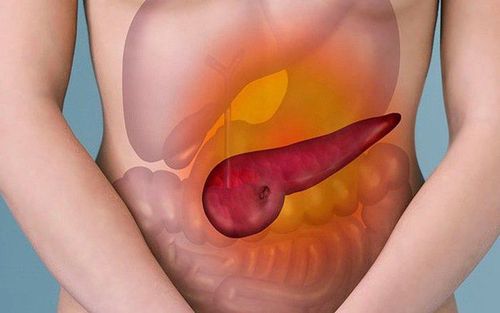This is an automatically translated article.
Pancreatic tumor is a tumor that occurs in the pancreas. Pancreatic head tumors account for the majority of pancreatic tumors. Pancreatic tumors can cause many dangerous complications if not treated early. Let's find out if pancreatic tumors are dangerous in the article below.
1. Symptoms of Pancreatic Tumors
The pancreas is located behind the stomach, close to the posterior abdominal wall. Weighs about 80 grams. Composed of head, body and tail. Dimensions are 15 cm long, 6 cm high and 3 cm thick. The pancreas secretes hormones that help with digestion and regulate blood sugar.
Symptoms of pancreatic tumors include: epigastric pain, jaundice, yellow eyes, itchy skin, diarrhea, silvery stools, fatty stools, upper gastrointestinal bleeding, vomiting.
2. Is pancreatic tumor dangerous?
Pancreatic tumors are of two types, benign and malignant. Pancreatic head tumors account for 70% of pancreatic tumors. Benign pancreatic head tumors are rare but can still cause biliary obstruction. Malignant pancreatic head tumors are the second leading cause of death among gastrointestinal cancers. Pancreatic tumor is a dangerous disease that severely affects the health, quality of life and threatens the patient's life. The risk of pancreatic tumors no longer depends on the type of tumor and the stage of the disease. Most pancreatic tumors are cancerous.Endocrine pancreatic head tumors can cause long-term hypoglycaemia, permanent damage to the central nervous system, more severe in young children. After the diagnosis of pancreatic cancer, the 5-year survival rate in stage I is 12-14%, stage II is 5-7%, stage III is 3%, and terminal stage is 1%. Early detection of pancreatic tumors is very important to increase the likelihood of a patient's cure. However, most pancreatic tumors are detected late because the symptoms are not clear.
3. Should pancreatic head tumor be operated?
Benign or malignant pancreatic head tumors require early treatment. The method of treatment depends on: tumor size, tumor nature, symptoms, complications, health status and treatment desire of the patient. Commonly used methods include:
Surgery:
This is the main method to remove the tumor. Most effective when the tumor is at an early stage, small in size, has not invaded surrounding tissues. Depending on tumor size and stage of disease, surgical removal of part or all of the pancreas. With advanced pancreatic head cancer, the patient's health is not enough to respond to surgery or surgery is not effective because it has metastasized. Chemotherapy:
Using chemicals to kill cancer cells, prevent cancer cells from growing. Commonly used in the treatment of various types of cancer. Pancreatic cancer is usually less sensitive to chemotherapy, so chemotherapy is often not effective. Radiation therapy:
This is an effective treatment for pancreatic tumors. Currently, chemotherapy is often combined with radiation therapy to increase the effectiveness of killing cancer cells. Note:
After surgery to remove pancreatic tumor, it is necessary to pay attention to rest, and supplement with digestive enzymes. The treatment process for malignant pancreatic tumors can be prolonged due to complicated complications. Once pancreatic cancer is under control, maintenance therapy is still needed to prevent cancer cells from continuing to grow. Pancreatic cancer is a dangerous disease with a high risk of death. Early detection and treatment of pancreatic tumor is very important, it affects the patient's survival. Contact your doctor immediately if you have any questions about pancreatic tumors.
Follow Vinmec International General Hospital website to get more health, nutrition and beauty information to protect the health of yourself and your loved ones in your family.













